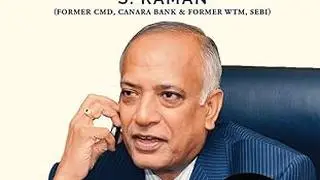This review should have been written two weeks ago. But my phone got in the way. Yes, seriously. The most distracting device on earth has to be the smartphone. All of us know there is a price attached to being always connected. Yet, we don’t unplug. The phone overwhelms our lives as it sends us down various rabbit holes of distractions.
Also, I must confess that I delayed reading this much hyped book by Nandan Nilekani and Tanuj Bhojwani as I expected it to be yet another tome harping about toxic tech and telling us to switch off and reclaim our mind spaces. After all, this was perhaps the most favourite topic of books, webinars, even ads by phone companies, during the pandemic, when discussions on mental health came to the forefront.
The start of the book with its example of an entrepreneur who is used to doing everything on his phone - from booking cars to finding restaurants - going on a holiday to a no-wifi, barely any network zone and forced to confront the real world, meet people to make his way around, and coming back utterly rejuvenated seemed like it was treading the predictable path.
But, pleasant surprise – the book takes a turn at this point. Our entrepreneur who had resolved after his holiday to switch off his phone at 5.30 pm everyday to soak in the sunset, goes back to his old ways and ends up feeling stressed again.
The authors step in here and tell you that this book is not about helping us spend less time on our devices. Instead its goal is to spend our time on our devices better.
That is when my interest perked up.
The book recognises that the basic problem is that our extended mind – with or without devices - often has a tendency to wander, and procrastinate, and technology only amplifies these tendencies by putting distracting tools in our hands.
The good news, say the authors, is that our extended minds are programmable, and our digital devices can be configured to assist us rather than distract us.
The first three chapters of the book are spent highlighting the problem with us, the problem with technology and our toxic relationship with tech. It’s pretty much useless to call on our willpower to become de-addicted to these distracting digital habits, say the authors, diving into psychology to explain why. Also, as they say, it’s not enough to focus on the addict and the substance – the environment is also critical. So, in order to practice “bitfulness” – the corny word the authors have coined for the ability to spend our time on our devices better– you need to change the environment too, which might seem to be a bit of a talk ask.
This leads us to the second part of the book which teaches you how as an individual you can be ‘bitful’. This is the meat of the book with plenty of useful tips on how to use technology to work for you, whether it is making notes of conversations on note-taking software, junking the to-do lists you make and instead put your tasks on the calendar so that you actually are setting aside time for it, or stuff like organising your documents on your computer (the authors recommend creating just three folders and not more and then backing them on the cloud), navigating social media, etc. Some of this may sound simplistic, but peppered as it is with anecdotes of how leaders from the IT world organise their digital lives, it captures and holds your attention. For the tips, there is a useful appendix at the end, with names of apps, and software that can help us manage our digital lives.
The third section of the book is The Collective and actually the most interesting part for me as it discusses a new way of building tech and looks at our collective technology. Of course, the Aadhar and UPI examples are there. It looks at how going forward our digital infrastructure should be architected as it affects all of us. “Can we think of our collective technology as a public good and not as an opportunity for blitzscaling?” How will this be funded is an inevitable question –the answer may be a digital tax.
The book not only gives you useful tips but leaves you with plenty to think about our digital future.
(Chitra Narayanan is an editorial consultant with The Hindu Businessline)
About the Book
The Art of Bitfulness: Keeping Calm in the Digital World
Nandan Nilekani / Tanuj Bhojwani
Penguin Allen Lane
Rs 799 (hardcover) ; 228 pages








Comments
Comments have to be in English, and in full sentences. They cannot be abusive or personal. Please abide by our community guidelines for posting your comments.
We have migrated to a new commenting platform. If you are already a registered user of TheHindu Businessline and logged in, you may continue to engage with our articles. If you do not have an account please register and login to post comments. Users can access their older comments by logging into their accounts on Vuukle.